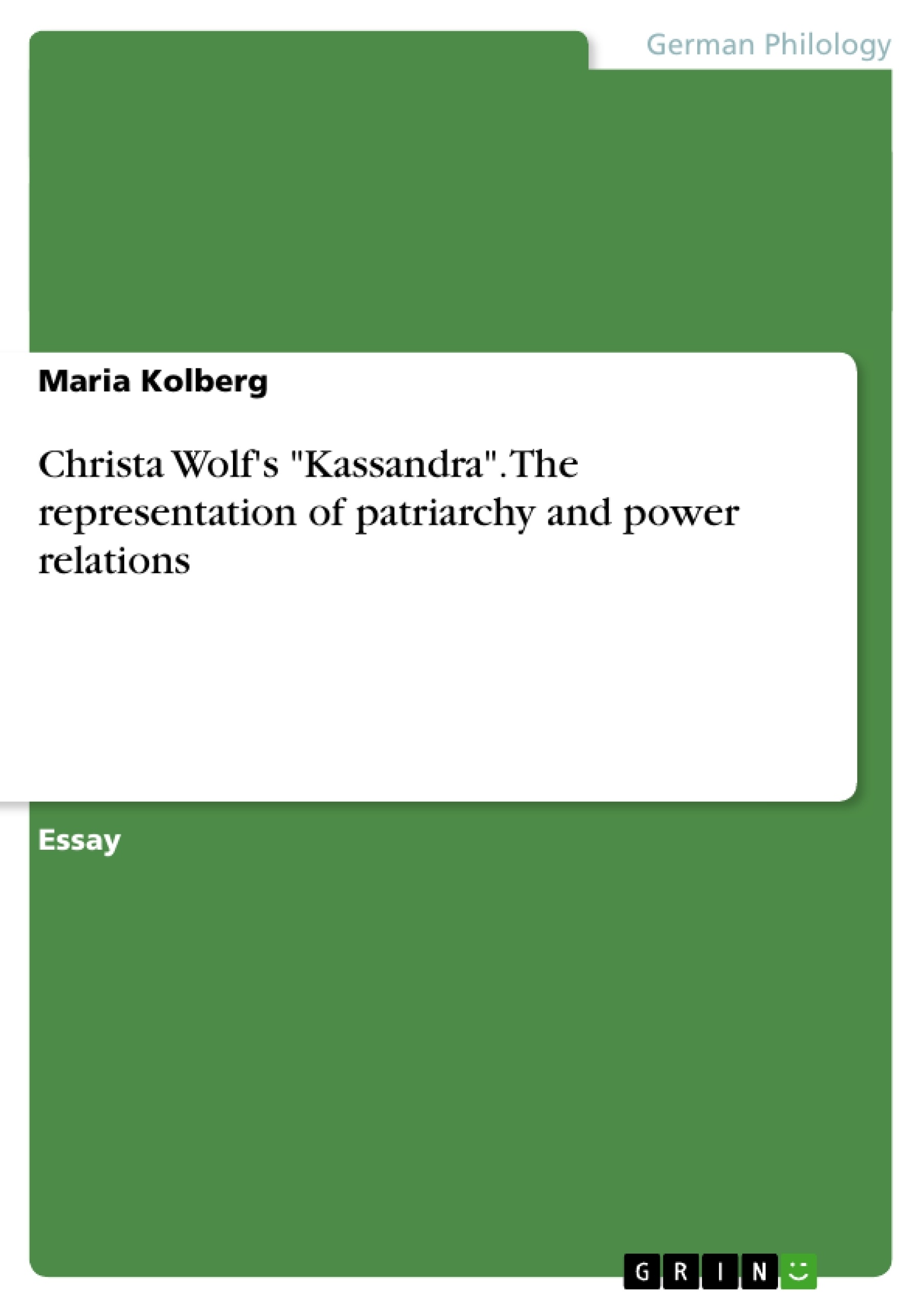Cassandra – a modern woman in ancient times. The East-German writer Christa Wolf publishes the story about the Trojan king’s daughter Cassandra, who is judged to be unseen although being blessed with the gift of prophecy in 1983. The story is told retrospectively by the dying Cassandra waiting in front of the “Löwentor” for her execution in Agamemnon’s castle. Throughout the story, one can figure out a re-creation process of herself and a development from a silent female object into a conscious subject. Similarly to Christa Wolf, who tried to achieve a certain self-understanding as a woman author while writing the narrative (Kuhn, p. 186).
In addition, there are some suppositions that Wolf criticises in Cassandra the political structure of the former GDR. Even the characters represent political entities. Priam, in that sense, stands for the social state, Hecuba for the party and Eumelus for the State Security Service (Kuhn, p. 184).
Furthermore, it is a “feminist critique of literature and society” (Kuhn, p. 178) and describes a radical social change from matriarchy to patriarchy on the basis of the ancient myth of Cassandra. For this purpose, Wolf uses the male figures partly to correct the exclusion of women in the ancient models by Aeschylus and Homer. In these dramas women were depicted as dependent objects. In Christa Wolf’s famous Frankfurter Poetik-Vorlesung in 1982, she speaks about questions which might arise by the reader. More specifically, in A Letter, her fourth lecture on poetics, Wolf disapproves the constant exclusion of female writers in the history of literature and in society. Wolf declares in her essay that
an [essential characteristic of the origins of the Greek epic] [is the] amalgamation of patriarchy, property, and hierarchy, coupled with the simultaneous displacement, exclusion, and objectification of women (Kuhn, p. 186).
With her rewriting of the myth she tries to resolve the fact that “the experienced reality of women” of the Trojan War has been excluded (Kuhn, p. 188). In that sense, Cassandra’s exemplary subjectivity should encourage female resistance in a patriarchal world (Kuhn, 191). The story Cassandra shows the displacement of a matriarchal or at least a society with equal rights by a patriarchal system. Therefore, I am going to discuss how patriarchy is represented and how power relations are depicted in the following essay.
Inhaltsverzeichnis (Table of Contents)
- Cassandra a modern woman in ancient times
- Social Change from Matriarchy to Patriarchy
- Patriarchal Power Relations in the Trojan War
- The Male Dominance in Greek Mythology
- The Exclusion of Women in the Trojan War
- Cassandra's Prophecy and the Fall of Troy
- Cassandra's Madness and the Oppression of Women
- The Subordinate Role of Women in Troy
- The Relationship between Cassandra and Helenus
- The Treatment of Women as Property
- The Power of the Greek Enemy Agamemnon
Zielsetzung und Themenschwerpunkte (Objectives and Key Themes)
This essay examines the representation of patriarchy and power relations in Christa Wolf's novel Kassandra. It analyzes how the story of Cassandra, a Trojan princess cursed with the gift of prophecy, reflects the shift from a matriarchal to a patriarchal social order in ancient Greece. The essay focuses on the themes of female subjugation, the silencing of women's voices, and the displacement of matriarchal values by patriarchal dominance.
- The transition from a matriarchal to a patriarchal society in ancient Greece.
- The portrayal of women as objects in a patriarchal society.
- The consequences of the dominance of male power on women’s lives.
- The importance of female resistance against patriarchal oppression.
- The role of prophecy and its relation to female agency.
Zusammenfassung der Kapitel (Chapter Summaries)
The essay begins by exploring the social order of Cassandra’s childhood, where her mother, Queen Hecuba, held power and authority. The Trojan War, however, signifies a radical shift in power dynamics, with Greece representing patriarchy and Troy symbolizing the displaced matriarchy. The essay examines the portrayal of various male characters, including Panthoos, Aeneas, King Priam, and Helenus, and how their actions and attitudes contribute to the oppressive patriarchal system.
The text further explores the consequences of Cassandra’s prophetic gift, which exposes the oppression of women and the dominance of men. Her inability to be believed and her subsequent madness are interpreted as a consequence of her defiance against patriarchal norms.
The essay also analyzes the treatment of women as property, exemplified by the promise of Polyxena to the Greek hero Achilles. It concludes with an examination of the Greek enemy Agamemnon, initially presented as weak and vulnerable, who ultimately intends to exploit his power over Cassandra.
Schlüsselwörter (Keywords)
This essay examines the representation of patriarchy, power relations, female subjugation, matriarchy, patriarchal dominance, female resistance, prophecy, and the silencing of women's voices in Christa Wolf’s Kassandra. It analyzes the story of Cassandra as a representation of the historical and social context of ancient Greece, emphasizing the critical role of gender dynamics in shaping the narrative.
Frequently Asked Questions
What is the central theme of Christa Wolf's "Kassandra"?
The novel explores the transition from a matriarchal to a patriarchal society and the resulting oppression and silencing of women.
How does Cassandra develop as a character?
She evolves from a "silent female object" into a "conscious subject" who resists the patriarchal power structures of Troy and Greece.
What does the character Eumelus represent in Wolf's novel?
In a political reading, Eumelus is often seen as a representation of the State Security Service (Stasi) of the former GDR.
Why is Cassandra's prophecy ignored?
Her gift is judged as madness within the patriarchal system, serving as a metaphor for the exclusion of women's voices in history.
How are women depicted in the ancient models of Homer and Aeschylus?
Christa Wolf criticizes that in these classic epics, women were primarily depicted as dependent objects or property.
- Citar trabajo
- Maria Kolberg (Autor), 2011, Christa Wolf's "Kassandra". The representation of patriarchy and power relations, Múnich, GRIN Verlag, https://www.grin.com/document/230750



